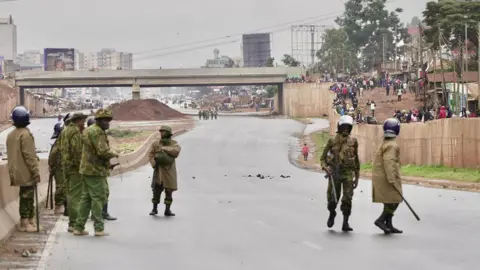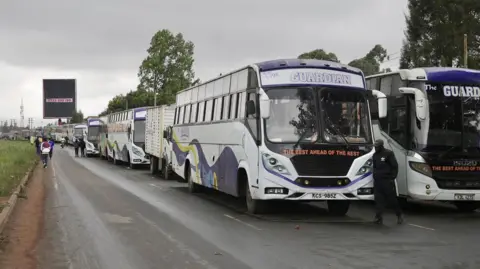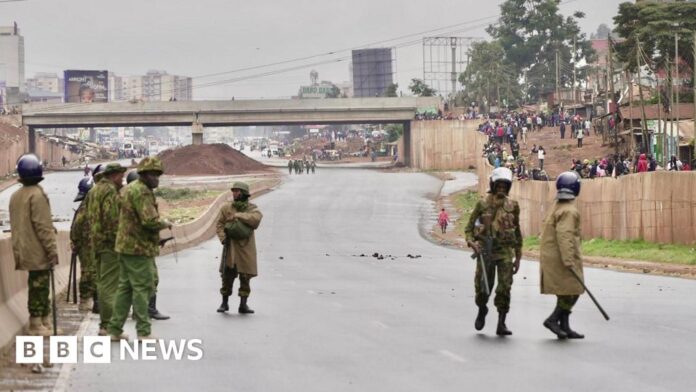BBC News, Nairobi
 Anthony Irungu / BBC
Anthony Irungu / BBCKenya’s security forces have blocked all major roads leading into central Nairobi, ahead of planned nationwide protests.
Much of the city centre is deserted, with businesses shut and a heavy security presence on the streets. Some schools have advised students to stay at home.
Hundreds of early-morning commuters and overnight travellers were stranded at checkpoints, some located more than 10km (six miles) from the city centre, with only a few vehicles allowed through.
Within the city, roads leading to key government sites – including the president’s official residence, State House, and the Kenyan parliament – are barricaded with razor wire.
In a statement issued on Sunday evening, the police said it was their constitutional duty to protect lives and property while maintaining public order.
Monday’s protests, dubbed Saba Saba (Swahili for 7 July), commemorate the 1990s struggle for multiparty democracy in Kenya.
These demonstrations have been organised primarily by the so-called Gen-Z young people, demanding good governance, greater accountability, and justice for victims of police brutality. They are the latest in a wave of anti-government protests that began last year.
On 25 June, at least 19 people were killed and thousands of businesses looted and destroyed in a day of nationwide protests that were being held in honour of those killed in last year’s anti-tax protests.
Recent demonstrations have turned violent, with reports of infiltration by “goons”, who are accused of looting and attacking protesters. Civil society groups allege collusion between these groups and the police – accusations the police have strongly denied.
On Sunday, an armed gang attacked the headquarters of a human rights NGO in Nairobi. The Kenya Human Rights Commission (KHRC) had been hosting a press conference organised by women calling for an end to state violence ahead of Monday’s protests.
The KHRC spokesman, Ernest Cornel, said that the gang was made up of at least 25 people on motorbikes chanting that “there will be no protest today”.
“They were carrying stones, they were carrying clubs… they stole laptops, they stole a phone and they also took some valuables from journalists who were there,” he told the BBC Newsday programme.
This year marks the 35th anniversary of the original Saba Saba protests – a key moment that helped usher in multiparty democracy in Kenya after years of one-party rule.
The response by the then government under President Daniel arap Moi was brutal. Many protesters were arrested, while at least 20 people were reportedly killed.
Since then, Saba Saba has come to symbolise civic resistance and the fight for democratic freedom in Kenya.
 Anthony Irungu / BBC
Anthony Irungu / BBCBy mid-morning on Monday, hundreds of overnight passengers remained stranded outside the city centre, with major roads still closed.
Some long-distance buses were parked at Kabete area, about 13km from the city centre, with many passengers who could not afford to pay extra money for motorcycle rides to their destinations remaining there.
Humphrey Gumbishi, a bus driver, said they had started their journey on Sunday evening only to find the police road block in the morning.
“We started travelling at 8:30pm last night… We want the government to engage in a dialogue with Gen Zs so all this can come to an end,” he told the BBC.
Elsewhere around the city, police confronted groups of people attempting to break the security cordon. The police fired tear gas to disperse people on Thika Road, as well as in Kitengela, a town on the outskirts of the capital.
In Kamukunji, near the venue where the original Saba Saba protests were held, police battled groups of protesters who lit fires on the streets.
Most other areas around the country have been quiet, with some clashes reported in some towns.
You may also be interested in:
 Getty Images/BBC
Getty Images/BBC


